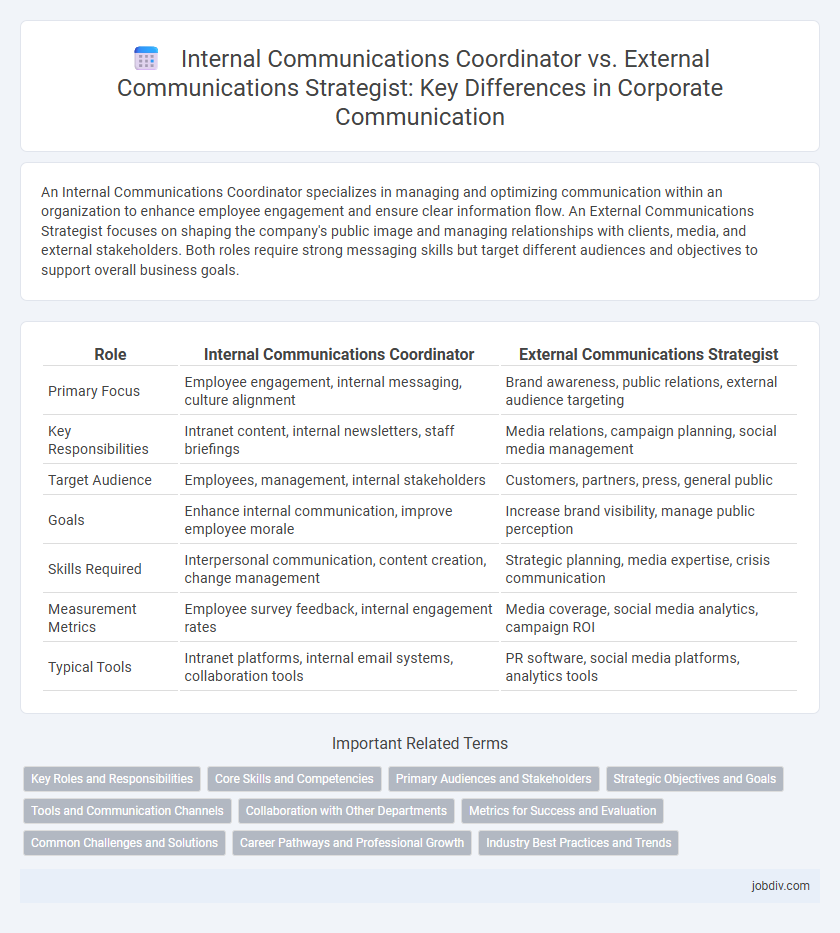An Internal Communications Coordinator specializes in managing and optimizing communication within an organization to enhance employee engagement and ensure clear information flow. An External Communications Strategist focuses on shaping the company's public image and managing relationships with clients, media, and external stakeholders. Both roles require strong messaging skills but target different audiences and objectives to support overall business goals.
Table of Comparison
| Role | Internal Communications Coordinator | External Communications Strategist |
|---|---|---|
| Primary Focus | Employee engagement, internal messaging, culture alignment | Brand awareness, public relations, external audience targeting |
| Key Responsibilities | Intranet content, internal newsletters, staff briefings | Media relations, campaign planning, social media management |
| Target Audience | Employees, management, internal stakeholders | Customers, partners, press, general public |
| Goals | Enhance internal communication, improve employee morale | Increase brand visibility, manage public perception |
| Skills Required | Interpersonal communication, content creation, change management | Strategic planning, media expertise, crisis communication |
| Measurement Metrics | Employee survey feedback, internal engagement rates | Media coverage, social media analytics, campaign ROI |
| Typical Tools | Intranet platforms, internal email systems, collaboration tools | PR software, social media platforms, analytics tools |
Key Roles and Responsibilities
Internal Communications Coordinators primarily manage employee engagement, streamline information flow within organizations, and coordinate internal messaging to enhance workplace culture. External Communications Strategists focus on brand positioning, media relations, and crafting strategic campaigns that influence public perception and drive audience engagement. Both roles require expertise in communication channels, but while internal coordinators optimize organizational communication, external strategists concentrate on market-facing strategies.
Core Skills and Competencies
Internal Communications Coordinators excel in employee engagement, message clarity, and organizational culture alignment, demonstrating strong interpersonal skills and proficiency in communication platforms. External Communications Strategists specialize in brand messaging, media relations, and market analysis, leveraging expertise in public relations and digital marketing. Both roles require strategic thinking, content creation, and audience segmentation to effectively tailor communication efforts.
Primary Audiences and Stakeholders
Internal Communications Coordinators primarily engage employees, management, and internal teams to ensure seamless information flow and reinforce organizational culture. External Communications Strategists focus on customers, investors, media, and public audiences to shape brand perception and manage stakeholder relations. Both roles tailor messaging to their distinct primary audiences but collaborate to maintain consistent overall communication.
Strategic Objectives and Goals
Internal Communications Coordinators prioritize aligning communication initiatives with organizational culture and employee engagement to enhance internal collaboration and productivity. External Communications Strategists focus on shaping brand perception and managing public relations to drive market growth and stakeholder trust. Both roles target strategic objectives that support overall business goals through tailored messaging and audience-specific communication.
Tools and Communication Channels
Internal Communications Coordinators utilize tools such as intranet platforms, email newsletters, and collaboration software like Microsoft Teams or Slack to streamline information flow within organizations. External Communications Strategists focus on public-facing channels including social media platforms, press releases, and content management systems to enhance brand visibility and stakeholder engagement. Both roles require expertise in digital communication tools, but Internal Coordinators prioritize employee engagement technologies while External Strategists emphasize media outreach and audience targeting platforms.
Collaboration with Other Departments
Internal Communications Coordinators work closely with HR, IT, and management teams to ensure consistent messaging and employee engagement across the organization. External Communications Strategists collaborate with marketing, sales, and public relations departments to align external campaigns with brand objectives and target audiences. Both roles require seamless cross-departmental collaboration to maintain unified communication strategies and optimize organizational impact.
Metrics for Success and Evaluation
Internal Communications Coordinators measure success through employee engagement surveys, message reach, and feedback loops, emphasizing clarity and alignment within the organization. External Communications Strategists evaluate metrics such as media coverage, social media engagement, brand sentiment, and lead generation to gauge impact on target audiences and market positioning. Both roles rely on data-driven analysis but prioritize different KPIs aligned with their communication objectives.
Common Challenges and Solutions
Internal Communications Coordinators face challenges such as fostering employee engagement and ensuring message consistency across departments, often addressing these through targeted intranet platforms and regular feedback loops. External Communications Strategists encounter difficulties in maintaining brand reputation and managing diverse media channels, typically overcoming these by leveraging data-driven audience analysis and strategic media partnerships. Both roles require adaptable communication strategies and crisis management skills to align organizational goals with stakeholder expectations.
Career Pathways and Professional Growth
Internal Communications Coordinators specialize in enhancing employee engagement and streamlining organizational messaging, often advancing towards roles like Internal Communications Manager or HR Communications Specialist. External Communications Strategists focus on brand reputation, media relations, and public outreach, with career trajectories leading to positions such as Public Relations Director or Corporate Communications Executive. Both career paths emphasize strategic communication skills, but growth opportunities differ based on internal audience focus versus external market engagement.
Industry Best Practices and Trends
Internal Communications Coordinators prioritize fostering employee engagement through clear, consistent messaging, utilizing platforms like intranet portals and collaboration tools to enhance organizational alignment. External Communications Strategists focus on brand reputation by crafting targeted campaigns across social media, PR outlets, and digital marketing channels, leveraging data analytics and content personalization to reach diverse audiences effectively. Industry best practices emphasize integrating both roles through unified messaging frameworks and adopting AI-driven communication tools to optimize impact and ensure coherence across internal and external stakeholders.
Internal Communications Coordinator vs External Communications Strategist Infographic

 jobdiv.com
jobdiv.com